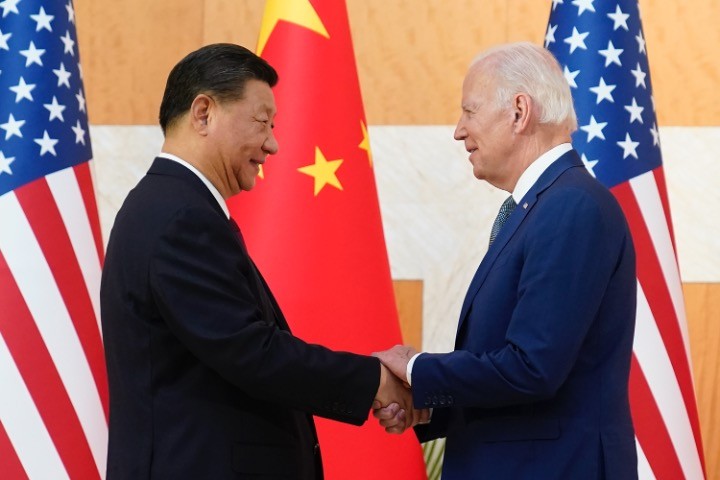Elites’ Goals Revealed in Bali During G20
Цели элит раскрыты на Бали во время G20

Xi Jinping and Joe Biden at G20 Summit in Bali
Слежка была важной чертой текста, к которому неоднократно возвращалось руководство G20:
«Пандемия COVID-19 ускорила трансформацию цифровой экосистемы и цифровой экономики. Мы признаем важность цифровой трансформации для достижения ЦУР».
«Мы по-прежнему привержены внедрению многосекторального подхода «Единое здоровье» и усилению глобального эпиднадзора, в том числе геномного эпиднадзора, для выявления патогенов и устойчивости к противомикробным препаратам (УПП), которые могут угрожать здоровью человека».
Surveillance was an essential feature of the text that G20 leadership returned to repeatedly:
“The COVID-19 pandemic has accelerated the transformation of the digital ecosystem and digital economy. We recognize the importance of digital transformation in reaching the SDGs.”
“We remain committed to embedding a multisectoral One Health approach and enhancing global surveillance, including genomic surveillance, in order to detect pathogens and antimicrobial resistance (AMR) that may threaten human health.”
The G20, or Group of Twenty, held their annual summit on November 15 and 16 in Bali, Indonesia.
Russia’s incursion into Ukraine loomed large over the two-day event, with many Western nations seeking censure of Russia, if not a formal end to Russia’s role in G20.
Ukraine’s President Volodymyr Zelensky requested support from “G19” nations, and U.K. Prime Minister Rishi Sunak characterized Russia’s battle with Ukraine as a threat to “international order.”
Though the theme of Russian isolation was a clear motif in Bali, a final joint communique acknowledged that “there are other views and different assessments of the situation.”
China’s Xi Jinping and India’s Narendra Modi appeared to reject calls for Russia’s removal from the conference. For his part, Vladimir Putin declined to attend, citing intelligence that an attack on the Russian delegation was likely.
As the drama of the war in Ukraine and Russia’s isolation dominated headlines in the West, the official record of the event — a joint declaration titled G20 Bali Leaders’ Declaration — went largely unexamined by Western media.
This remarkable 17-page document appeared on the White House website following the conference. Revealing the priorities of the world’s most powerful, the joint communique plainly rendered the elite dream of enhanced top-down management and technological control over all sectors of society — a dream perhaps threatened by an era of fracture and populism.
In addition to the war in Ukraine, concerns of world leaders revealed in the document included:
Sustainable Development Goals, identified with the UN’s Agenda 2030. On these goals (“SDGs”), the G20 leadership wrote of a desire to “Recommit to accelerate achievement of the SDGs, achieving prosperity for all through sustainable development.”
Energy policy and the goal of downscaling energy use was an obvious focal point for the G20 leaders: “We commit to reduce environmental impacts by changing unsustainable consumption and production patterns,” G20 leaders stated, elsewhere writing: “We reiterate our commitment to achieve global net zero greenhouse gas emissions/carbon neutrality by or around mid-century.”
To achieve these goals, G20 leadership declared: “we reiterate that our policy mix toward carbon neutrality and net zero should include a full range of fiscal, market and regulatory mechanisms including, as appropriate, the use of carbon pricing and non-pricing mechanisms and incentives.”
![]()
Surveillance was an essential feature of the text that G20 leadership returned to repeatedly:
“The COVID-19 pandemic has accelerated the transformation of the digital ecosystem and digital economy. We recognize the importance of digital transformation in reaching the SDGs.”
“We remain committed to embedding a multisectoral One Health approach and enhancing global surveillance, including genomic surveillance, in order to detect pathogens and antimicrobial resistance (AMR) that may threaten human health.”
Food, perhaps surprisingly, was to be the subject of increasing surveillance as well:
“We will continue to strengthen the Agricultural Market Information System (AMIS) as an early warning tool, to enhance food and fertilizer/inputs market transparency, reduce market uncertainties, and support coordinated policy responses for food security and nutrition, through the sharing of reliable and timely data and information.”
Online “disinformation” was, of course, a point of great interest:
“We acknowledge the importance [of countering] disinformation campaigns, cyber threats, [and] online abuse, and ensuring security in connectivity infrastructure.”
Incorporating women more fully into the economy was a clear desire of the leaders as well, often rendered in a style recalling “woke” social-justice rhetoric:
“We will continue our work to integrate persons with disabilities, women, and youth across sectors and levels in pursuit of an inclusive labour market.”
Despite confidence from elites about the value and utility of the systems they would like to implement, at some points in the document uncertainty about whether they will achieve their goals was apparent:
“We are deeply concerned that multidimensional crises, including the COVID-19 pandemic, as well as lack of fiscal space and unequal access to finance and technology, are posing significant challenges towards realizing the 2030 Agenda for Sustainable Development and the Addis Ababa Action Agenda in a timely manner.”
It is unclear if G20 leadership will have their way, or if conflicts in Ukraine and the rising tide of world populism will thwart their goals.
It is clear, however, what the elites want, since sometimes, as in the statement that emerged from G20, it is barely disguised.
https://thenewamerican.com/elites-goals-revealed-in-bali-during-g20/

